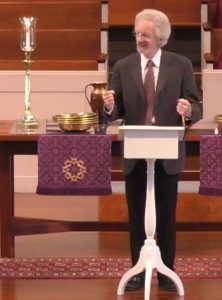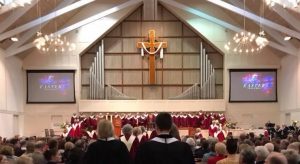 Sitting on the platform as a visiting speaker, I feel as if I have entered a time warp from the late 1950s. I look out on a church sanctuary packed with people dressed in their Sunday finest. These days, pastors where I live in Colorado tend to wear jeans and untucked shirts; here, in a 125-year-old church in a wealthy Philadelphia suburb, they are wearing robes over tailored suits.
Sitting on the platform as a visiting speaker, I feel as if I have entered a time warp from the late 1950s. I look out on a church sanctuary packed with people dressed in their Sunday finest. These days, pastors where I live in Colorado tend to wear jeans and untucked shirts; here, in a 125-year-old church in a wealthy Philadelphia suburb, they are wearing robes over tailored suits.
In advance of my visit the senior pastor sent me a draft copy of the church bulletin, and I noted the organ prelude, Samuel Barber’s Adagio for Strings. I complimented him on the choice, a lyrical piece that has been used in the soundtrack for such movies as Platoon, The Elephant Man, and Lorenzo’s Oil. He wrote back, “Samuel Barber was once the church organist here.” Hearing that, I worked a bit harder on my sermon.

Behind me gleam the pipes of the current organ, a modern replacement for the one that Barber played. Members of the large choir, who are also dressed in robes, stand to sing a classical piece for the offertory. As they sing I scratch through my notes, cutting extraneous details. “The second service is the most time-sensitive of the three,” the pastor has warned me. “We live-stream it, so please don’t go longer than fifteen minutes.” And now comes my time to speak.
I’m ten minutes into my sermon when a man strolls down the right aisle. In this white-bread congregation anyone with brown skin stands out like a granite rock in a snow field, and the congregation’s eyes follow him all the way to the second row, where he takes a seat. I can’t resist looking that way too. He has a shaved head, and a diamond earring in his right ear catches the light. I note his muscular build, biceps bulging beneath his short-sleeved dress shirt, and then turn my attention back to the sermon.
60 seconds, 45, 30—I watch the countdown clock in my peripheral vision and end just in time. As I turn toward my seat behind the pulpit, suddenly the visitor in the second row stands up and says in a loud voice, “Excuse me, Reverend.” I stop in mid-step.
“Thank you for what you said there. I really appreciate it,” he continues. “And now I have something to say to the folks here.”

A cloud of tension descends on this prim and proper church service. Clearly, nothing like this has ever happened here before. I glance at the senior pastor on the platform, who is staring at the bulletin. A trained usher moves toward the front, reaching discreetly under his sports coat for a firearm, just in case of trouble.
The visitor faces the crowd and says, “I love Presbyterians! You’re beautiful people. I spent 27 years in prison on drug charges, and while I was there two beautiful Presbyterians visited me and introduced me to Jesus. They changed my life. I was driving by here and saw the church and decided I just had to come inside. My wife doesn’t even know I’m here.”
I can sense the tension going down a notch. I don’t know when this church last held a testimony meeting, but so far we’re feeling relieved, liking what we hear.
“Things are going well for me,” he says. “I cleaned up my life, served my time, and got a decent job. My family’s living in a house with three bedrooms, two bathrooms, and two decks. Life is good.” Interesting detail, I think to myself—two decks.
He’s not finished. “There’s just one problem. I lost that job. I got another one, but I won’t get paid for a couple of weeks. And if I don’t come up with $853.50 by tomorrow, they’ll change the locks on that house and I’ll be out on the street again, homeless.” He keeps talking as the congregation sits silent, not knowing what to do.
I catch the senior pastor looking at his watch, and remember his warning about the strict time limit. With my headset microphone still on, I step down off the platform, walk over to the visitor, and say, “God bless you, brother. That took some courage. And I know there are people in this church who will want to hear all about it after this service.”
The choir director approaches the music stand to lead a closing hymn. The armed usher backs off. The visitor collapses on the pew, sobbing. The service draws to an end.

All this time my wife is sitting one row behind the visitor. A trained social worker, she has heard scores of similar stories at our former church in inner-city Chicago. This man, is he a skilled spinner of tales or a visiting angel come to test the spirit of a wealthy church? She watches as a few people gather around him to talk while a parade of others stuff his pockets with folded bills.
I have just spoken on Mark 9, a chapter in which Jesus scolds his disciples for their lack of faith, their selfishness, and their attitude of intolerance. In a flash our unexpected guest has cut right through the theoretical sermonizing and brought a dose of the real world to a county that the 2010 census ranked as the 25th richest in the nation.
“From what I could see,” Janet reports later that day, “he more than covered the money he claimed to need. And even if it was a scam, it certainly didn’t hurt the people who gave. They had a chance to put into practice what you were speaking about.”
![]()
 After returning to Colorado, I email the senior pastor and ask about any follow-up on the visitor. What did they learn? It turns out that he was from Washington, D.C., not Pennsylvania, and earlier that Sunday he had given the “Methodist” version of the same speech at the town’s Methodist church, where he collected $500.
After returning to Colorado, I email the senior pastor and ask about any follow-up on the visitor. What did they learn? It turns out that he was from Washington, D.C., not Pennsylvania, and earlier that Sunday he had given the “Methodist” version of the same speech at the town’s Methodist church, where he collected $500.
The pastor seems unperturbed by the deception. He writes,
The best part of it—the congregation’s generosity and desire to assist him was genuine, heartfelt, and engaged. I told them so the next Sunday, and suggested that however he chose to use the funds he received from us was not our worry—only that God would use the seeds of generosity planted that morning.
Extending grace always involves risk. A gift can be ignored, rejected, or exploited—a fact that applies to God’s grace toward us as well as our grace toward others.

Don’t miss the next post.
Subscribe to Philip Yancey’s blog here:


A poignant example of grace extended. Thanks for saving this, Philip.
As you can imagine, here in South Africa these situations are legion and its impossible to tell truth from fiction. The overwhelming majority of the stories are just that; stories. We try and solve our dilemma by supporting ngo’s that take care of these people and are more capable of determining the fakes. I guess that this is just a “cop-out” on our part but its a survival strategy for most of us!
That sounds like it was a good exercise for the church to offer help on the spot. But much more than that, the congregation was moved to action – being the hands and feet of Christ. That’s true religion. And as for the unexpected guest, may God show him more grace.
That’s a powerful testimony. Thank you for sharing.
As I left the local Department of Social Services offices, a lady approached me asking if I had two dollars I could spare. Having left my purse in the car, I was not sure if I had even that amount to give, so I said no to her request. But on checking my billfold I found I had a ten dollar bill, and a feeling such as described in the last paragraph of your blog came to me. I opened my car window as I drove back to where the lady still stood, told her I had been mistaken when I said I did not have two dollars, found that I ten dollars instead, and asked if that would help. Her thanks and smile were genuine. The Lord gave us one gift, that of choice, which does involve risk in many instances, but that day I felt grace in full measure and prayed that she received a share also in the gift.
Just finished a Bible study focused on your book prayer. Loved the emphasis on contemplation and hooks to the Joan of Norwich, etc.
Some say this contemplative approach is the key to the next wave of revival…something more than liturgy, more than doctrine, more than morality…and that is a personal relationship to our dancing God…re: Richard Rohr. What do you think?
By the way thanks for your encouragement 15 years ago…I finally finished my little historical fiction stories on our family farm and shared with my family. It was a life fulfilling moment. Keep on Keeping on Philip! Shalom! You are the ultimate story teller…and remind me of Y’shua!